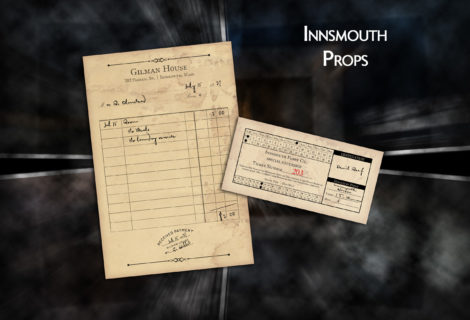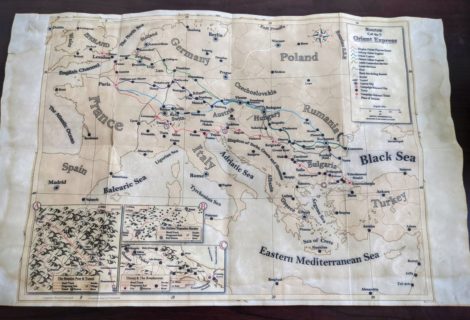Why Fate?

Fate Dice and Fate Points
This post has been a long time coming… but it’s going to have to wait just a little while longer. First, I want to briefly re-look at why I’m not using Call of Cthulhu or Trail of Cthulhu to play my games.
Call of Cthulhu
- I previously mentioned that I don’t like percentile and roll-under systems – it’s just a personal preference.
- Despite the updates over time, CoC is still rooted in a traditional Basic Roleplaying (BRP) system. Other than Sanity, there is very little alignment between the system and the style of story it’s trying to accomplish.
- I prefer each roll of the dice to be interesting, so I don’t like systems that involve constant die-rolling – especially those that require multiple rolls to resolve a single action.
- I want a system that supports and encourages the story, and stays out of the way the rest of the time. A game that has people developing complicated flow charts just to explain a basic mechanic (I’m looking at you Sanity mechanics) is not getting that done.
- I’ve lost track of how many times I’ve seen new CoC GMs ask about a rule (and I don’t mean a weird edge case) and the bulk of the advice is to not worry about the specifics of the rules and just focus on what makes sense in the story. That’s great advice, but it suggests that a lot of the great stories told playing CoC happen in spite of the system, not because of it.
Trail of Cthulhu
- I like that ToC directly tackles the issue of an investigation stalling because the players fail a die roll, but I don’t like the way it does it. Getting the vital clue automatically is fine, but it removes possibilities from the game. I like the idea of failing a roll to find a clue still resulting the players discovering the clue, but with an added complication. I think this approach still resolves the problem Gumshoe is trying to solve, but also creates new opportunities for interesting play.
- I really don’t like the point spend system to obtain additional clues. I believe the best games encourage players to focus on what their PCs are actually doing, not on what skills they want to use. The point spend system appears to work against that idea.
Why Fate?
So that hits the highlights of why I’m not just playing CoC or ToC. Which leaves the question of why I’m using Fate Core. If you’re familiar with Fate, you’re probably thinking one of two things: “I like Fate, but I’m not sure it makes sense for an investigative horror game.” or “I can’t stand Fate; what are you thinking?”
I’ll address both of those ideas in more detail, but I think it’s important to understand that there is a difference between the rules of Fate Core and the way people play Fate Core. Put another way, some people play RPGs in a fairly typical style using the Fate system, while others view and play Fate as a somewhat different style of RPG all together. Neither is wrong, but these two different styles of playing Fate can lead to a fair degree of confusion when discussing the game.
System Gets Out of the Way
As I’ve mentioned, I prefer roleplaying games that emphasize actual roleplaying, which I loosely define as “making decisions and taking actions as though you were your character.” In other words, the players (and the Keeper) act based on what their characters would do an any given situation, NOT based on the mechanical options granted to them by the system or other mechanical factors like which skill they want to use. Not only do I find this style of play much more enjoyable (assuming the Keeper is capable of effectively running this kind of game), but it is also easier to learn and teach to others.
Not only does Fate Core support this style of play, but it explicitly encourages it. The Golden Rule of Fate, often paraphrased as “Fiction First”, instructs players to “First, figure out what you want to do, then consult the rules to figure out how to handle it in the game.” This is arguably the central tenet of Fate, and as long as you stick to this concept you should end up playing a style of game along the lines of what I’m going for.
Elegant – Powerful Simplicity
Again, I like a system that let’s us focus on actually playing the game and pursuing the story. I want a system that’s easy to learn for the players and doesn’t require you to look up rules every time a new situation arises. If you need a flow chart for a core system of the game, that’s not good. With an eye towards keeping players focused on what’s going on in the story, I also prefer dice mechanics that are consistent, don’t require you to figure out what kind or how many dice to roll every time, and require a minimum of math.
Fate has a fairly small number of core elements that can be applied in different combinations. They can seem simple and minimalist at first, but once you start seeing how they can be used, it becomes more apparent that they can be used to handle virtually any situation. This approach emphasizes determining what’s actually important in the moment, as opposed to simply ‘in this situation, always follow this process’. This can actually be more challenging for Keeper’s to learn, compared to other system, but it also offers more possibilities and helps speed up gameplay. Ultimately, it can make things easier on everyone. It also encourages Keepers to understand why they are choosing to use a mechanic at any given time – rather than just blindly following a step-by-step process – and how those choices impact the game. This can ultimately help produce better Keepers and better games.
And if you’re rolling dice in Fate, you’re rolling four dice and adding a few numbers. You might make a decision about re-rolling or adding a couple more numbers, but that core mechanic doesn’t change. The basic process is consistent throughout the game.
Scalable
As you learn more about roleplaying game (and adventure) design you begin to see patterns in different areas of play. For example, using dice to resolve an action attempted by a character is serving the same purpose, regardless of who or what is attempting the action. The more you can utilize the same basic mechanics for similar circumstances, the easier the game is to learn. This also minimizes the amount of focus that everyone has to divert away from experiencing the story from the perspective of their character and towards the mechanics of the game (the cognitive load).
As an example, some games might have a whole separate additional system for resolving combat between military units on a battlefield. In some games, this uses a completely different ruleset from the core roleplaying game, which means you have to learn a whole new system for a situation that will only see limited use. In other games, this uses a ruleset closely mirrors the core game mechanics, which makes it quick and easy to learn. It also allows the players to better focus on why that battle is important to the story.
Fate uses the same basic mechanics regardless of the players involved. Resolving what happens when a single soldier fights an opponent on the battlefield uses the same process as two infantry units engaging in close quarter combat. The names of the skills being used might be different – just to help differentiate that these two operate on different levels of scale – but resolving these two actions is handled the same way. Indeed, virtually every element of Fate’s system can be applied the same way at any level of scale.
Simplifies the Narration
One thing I’ve never liked as a GM is blocks of text to be read aloud verbatim as part of a scenario. It always comes across as forced and artificial to me. Unfortunately, I’ve also sometimes not been so great at coming up with detailed narration on the spot. I’ve also noticed two trends in that occur sometimes in mystery games: First, if the narration doesn’t include something, the players assume it must not exist – which limits the options they feel are available to them. Second, if the narration does include something, the players assume it must be important. Don’t mention a painting on a wall if you don’t want the players to inspect every inch of it. This can create challenges for the GM or Keeper.
Fate uses Aspects – short descriptive phrases – to describe just about everything in the game. These Aspects are open-ended and allow everyone to make assumptions about the world. Describe a room as The History Professor’s Cluttered Basement Office, and everyone can reasonably assume it contains a desk, bookshelves, books, papers, and artifacts, as well it being dark and dreary. There’s no need to describe all of those things individually. This might seem odd at first to some veteran roleplayers, but it is incredibly freeing and effective in practice.
Adaptable
I’m a firm believer that the best games align their ruleset with the setting and themes of the game. So if I’m not going to build a game system from scratch, then I need to use a system that is already set up for investigative cosmic horror – or a system that can be easily modified. One thing the Fate is known for is how easily it can be hacked to suit a particular need. In fact, I would argue that Fate is actually more hackable than many players think. It has a reputation for producing a very particular style of play, but it’s capable of fostering other styles as well.
Wrap-Up
So that covers the highlights of why I’m using the Fate Core system, but if you’re concerned about how Fate can be used for investigative horror – or if you don’t like Fate – it probably doesn’t really address your concerns. Which is why my next post is going to discuss what I’m changing about Fate Core, and why…






Recent Comments